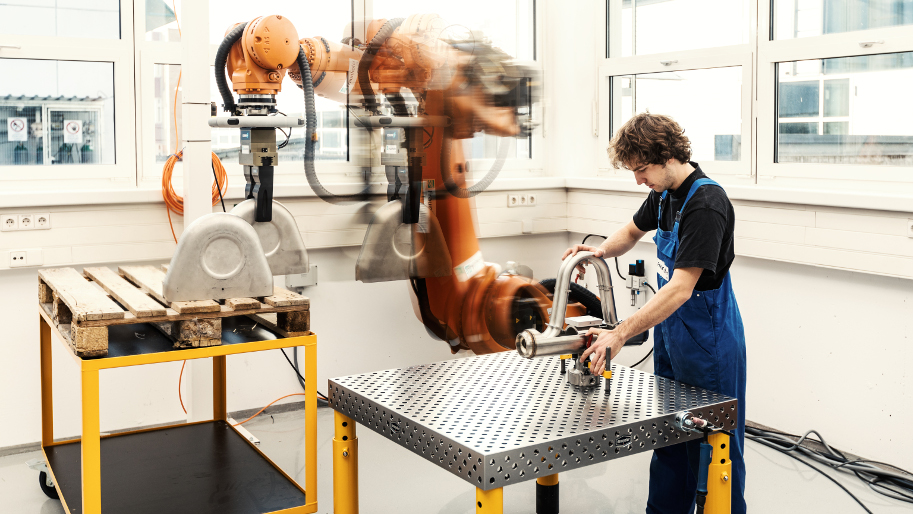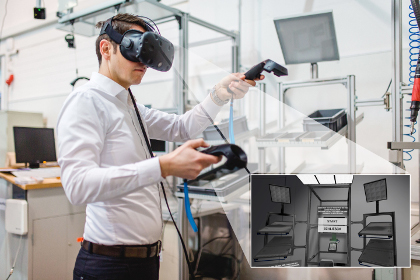“The Role Played by Humans Will Change Considerably”
 © Fraunhofer IPA/Rainer Bez
© Fraunhofer IPA/Rainer Bez
“Applied knowledge is crucial when designing the digitized working world:” an interview with Professor Wilhelm Bauer, executive director of the Fraunhofer Institute for Industrial Engineering IAO and chairman of the Fraunhofer Group for Innovation Research.
Professor Bauer, the future of work is the subject of research pursued by the Fraunhofer IAO, among other things in its “Future Work Lab”. What do you study in this laboratory?
The Future Work Lab is a demonstration and experience platform on the one hand and a research laboratory on the other. We use it to explore and illustrate how work will change as a result of the digital transformation, how the division of labor between humans and machines will be rearranged, and how the human-machine interface can be redesigned. One particular focus is on solutions in the context of Industry 4.0, especially when it comes to the growing use of cyber-physical systems in the industrial working world. This is because the use of interconnected systems such as tablet computers and smartwatches in production control gives rise to new opportunities for using personnel and resources more flexibly in the factory and logistic chains.
Will humans become less important in the digitised working world?
The role played by humans will change considerably in the near future and above all in the longer term: software, robots and other automated systems will be able to perform more and more tasks – especially highly formalized and structured work processes. In a new division of labor, humans will increasingly be responsible for designing concepts and organizing, controlling and monitoring work processes with machines assuming more and more of the physical work. Robots will only “take our jobs” if we leave existing structures in place and simply continue to automate them. As in the past, new jobs will only be created if we develop new products and services, that is to say if we remain innovative and do not merely maintain the status quo.
Which opportunities do you envisage in the digitized working world?
I believe that the upcoming developments offer considerable potential in terms of driving our working world forward in a positive way. For one thing, Germany as an innovation leader can contribute successfully to global value adding; and for another, digitization means that arduous work that is harmful to our health can be done by machines. If we manage to improve the skills and qualifications of workers by providing them with targeted further training, many of them will be able to participate in the positive developments and take on higher-level activities.
Which specific innovations are you particularly focusing on at the Fraunhofer IAO just now?
 We are looking in particular at how digital technologies are changing the way work is organized and how this changes the requirements for workers. Digitized technology has the potential to generate new opportunities for work to be organized more flexibly, irrespective of time or place.
We are looking in particular at how digital technologies are changing the way work is organized and how this changes the requirements for workers. Digitized technology has the potential to generate new opportunities for work to be organized more flexibly, irrespective of time or place.
Remote monitoring, remote service and remote control mean that workers no longer have to be at a specific place at a specific time but can, for example, handle tasks from home. This offers chances to better reconcile the demands of work and family. We are also interested in the question of innovation systems in companies: how can firms create new possibilities by collaborating with start-ups or establishing agile teams in-house? We are studying the particular conditions required for such organizational forms – in this context we talk of ambidexterity.
Where do you believe that Germany’s innovative strengths lie in the digitized working world, as compared with other countries?
In my view, we in Germany are virtually predestined to shape the way the digital world is interconnected with the real world. The Internet-of-Things (IoT) refers to the connection between the two worlds. Being a world market leader and producer of premium products, for example, in the automotive sector and in machine and plant manufacturing, we understand the fields of application better than almost anyone else. And it is precisely this applied knowledge that is crucial when designing the digitized value-adding chain and working world. We in Germany have a social partnership system that functions well. This is very helpful when it comes to shaping the future digitized working world in a responsible manner. I believe we have every chance of making the transition a success. Digitization is not something that is happening to us, it is something we can influence. All we have to do is play our part!
